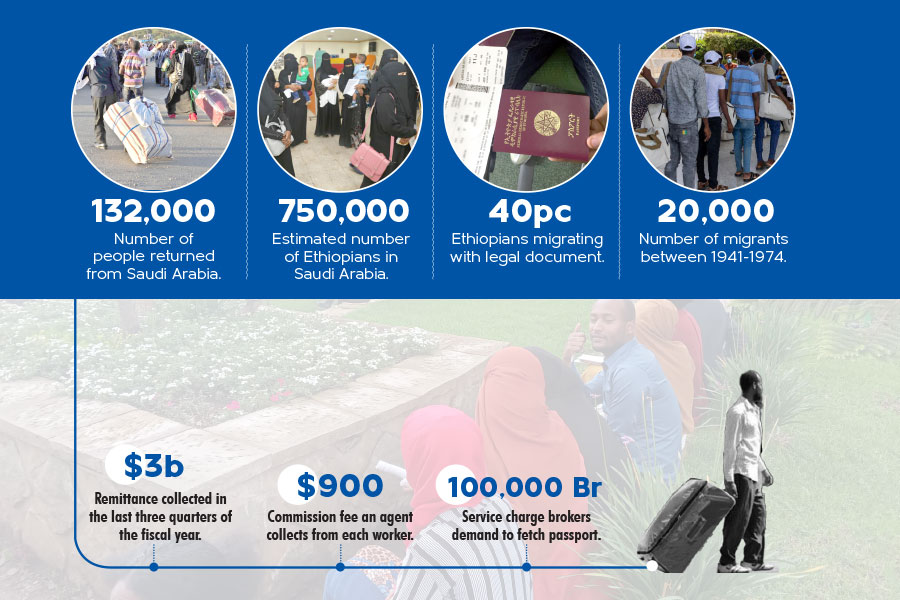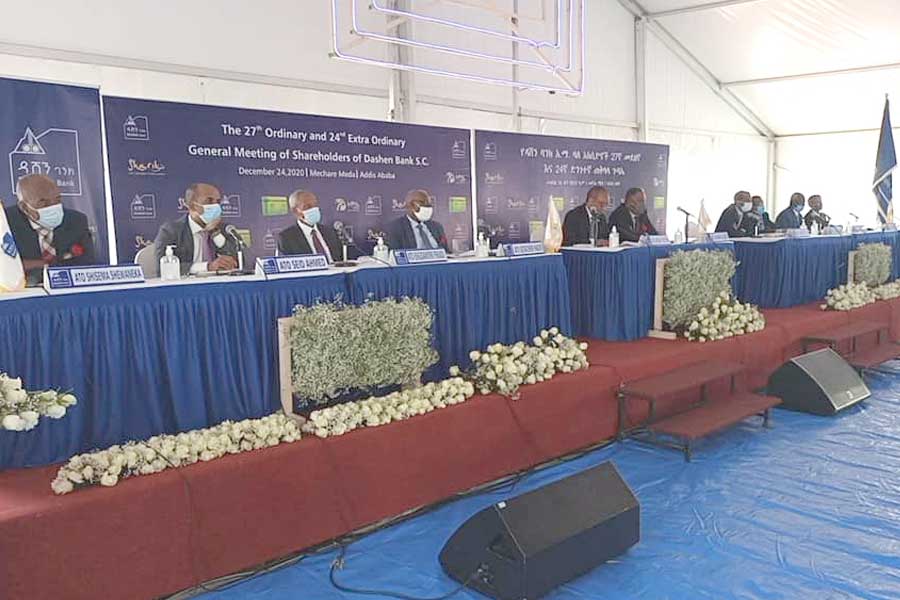
Commentaries | Mar 30,2019
Jul 29 , 2023.
In the colourful and vibrant Quality-Aqaqi District, a peculiar incident transpired recently. The notable Sheger Bread Factory, designed to provide millions of its fresh bread to Addis Abebans, abruptly ceased operations. A seemingly trivial event, yet it unveils a systemic flaw in Ethiopia's economy: the persistent challenges in project feasibility and long-term public planning.
The plant's sudden shutdown hinged on the unsustainable sourcing plan for its essential input: wheat. With the overwhelming official narrative of Ethiopia ceasing wheat imports owing to "self-sufficiency", city officials told the plant managers to rely on domestic supplies.
This, however, highlighted an endemic issue - the disconnection of lofty ambitions and painful realities on the ground. Authorities lauded the plant's subsidy on bread prices, a bounteous gesture to locals but economically impractical in the long run.
This case hints at a broader problem, a national inclination to herald projects divorced from local economic realities, making their eventual failure almost inevitable.
The factory's closure is not an isolated incident, though.
Further under scrutiny is the Ministry of Irrigation & Lowlands. Its ministers recently told Parliament that only 17 of the 27 projects under their jurisdiction were progressing. The culprits, according to the officials, are a lack of funding, security issues, and contractor misfeasance.
Parliamentarians, however, dismissed these explanations as mere distractions from the core issue: poor planning. The beleaguered Omo-Curaz sugar projects launched almost two decades ago, are also seen as emblematic of public projects burdened with poor foresight.
Behind the scenes, political appointees, often bereft of experience in managing sustainable businesses, champion several such projects. The scant public records on the funding and management of these projects leave room for speculation, but it seems clear that the revenue they generate falls significantly short of their construction costs. The pageantry and publicity associated with these projects' launches should not obscure the need for sustainable, long-term planning.
Across the country, Ethiopian farmers are growing restless over delayed fertiliser supplies. Even as authorities scramble to unload cargoes from the ports in Djibouti, their efforts are deemed too little, too late for this farming season. Farmers have already begun raiding warehouses in some places, leading to violent confrontations with local authorities.
Nevertheless, these incidents are but ripples on the surface, indicating a deeper malaise: a crisis in responsible, prudent and disciplined fiscal management. The prioritisation of the immediate over the long term is a troubling trend, potentially sacrificing rewarding future investments.
This focus on short-term gains is highlighted in the recent budget bill ratified by Parliament. The most alarming trend compared to previous fiscal years is the shift in emphasis from capital to recurrent expenditure.
In the 2023-24 budget, recurrent expenditure reached a record 370.1 billion Br (3.3pc of GDP), overshadowing capital expenditure at 203.4 billion Br (1.8pc). This all-time low for capital spending indicates a marked shift in budgetary priorities. Recurrent costs consume almost 46pc of total expenditure, while capital spending languishes at a mere 25pc.
Capital expenditure, earmarked for infrastructure projects, education, and health facilities, plays a critical role in sustaining economic growth, generating employment, and reducing poverty. These investments enhance productivity and facilitate long-term growth.
However, the recent cutback in capital expenditure suggests dwindling growth potential and raises concerns about Ethiopia's capacity to achieve the Sustainable Development Goals (SDGs) and other long-term development objectives.
A considerable chunk of the budget - 27.8pc - is also set aside for debt servicing, highlighting the burgeoning debt burden. The looming threat of debt may sideline critical public spending in health, education, and infrastructure, undermining sustainable development and economic resilience.
Indeed, fiscal policies need to respond to immediate challenges and seize emerging opportunities. Given Ethiopia's pressing social needs, a shift towards recurrent expenditure may seem justifiable. However, the longer-term implications of these trends should have warranted close Parliamentary scrutiny.
A pragmatic perspective might argue that Ethiopia's approach is fiscally prudent given the challenging economic conditions. The rise in recurrent expenditure could be seen as an attempt to strengthen social safety nets and public services amidst global pandemic-related needs and domestic conflicts. The focus on roads and education, commanding 11.9pc and 9.7pc of federal government expenditure respectively, could be used as a testament to this.
The cutback in capital expenditure may be deemed a necessary short-term sacrifice, with the federal government prioritising immediate needs over long-term projects. This reasoning might provide a buffer against potential external economic instabilities as Ethiopia recovers from the pandemic's economic shocks, geopolitical tensions and a domestic political crisis.
The balance between meeting immediate needs and securing long-term growth potential is delicate. A more proportional allocation between recurrent and capital expenditures, diversification of revenue streams, and a prudent borrowing strategy is key to traversing this fiscal maze.
And taxpayers should brace themselves. The new fiscal year will be a test. The budget heavily depends on domestic tax revenues, constituting a staggering 85pc of total revenue. The remaining 15pc, the lowest in decades, will come from non-tax revenues and grants.
Projections show an expected nine percent increase in revenue and grants, driven predominantly by a 10pc rise in tax revenue, hinting at an attempt to enhance tax collection efficiency.
However, the reliance on domestic tax may disproportionately burden low-income households, intensifying concerns about income inequality and poverty. The over-dependence on domestic tax revenue poses structural risks to the economy, making it susceptible to business cycles and economic shocks.
The forecasted budget deficit of 281 billion Br is another cause for worry. Primarily to be covered by domestic borrowing, this deficit could exacerbate Ethiopia’s debt issues and potentially trigger greater macroeconomic instability.
Persisting inflation, despite optimistic projections of a drop, remains a challenge. The history of double-digit inflation, increased recurrent expenditure, and domestic borrowing may exert upward pressure on inflation, eroding income values and exacerbating poverty.
However, the silver lining may be the projected GDP growth rate of 7.5pc. While lower than the previous years, this growth rate could potentially alleviate some of Ethiopia’s fiscal pressures if it is inclusive and broad-based. And, indeed, if it will be achieved.
Yet, no fiscal measures can substitute for professional and competent bureaucratic management. Efficiency in project planning and execution and transparency in budget distribution warrant closer scrutiny. Public funds must be used effectively for their intended purpose.
Ethiopia's fiscal trajectory is caught between immediate socioeconomic needs and the pursuit of long-term economic development. For inclusive growth, fiscal policy should support the poor and vulnerable while fostering a conducive environment for private sector development. Navigating this predicament will require a delicate blend of prudence and strategic foresight
PUBLISHED ON
Jul 29,2023 [ VOL
24 , NO
1213]

Commentaries | Mar 30,2019

Editorial | May 27,2023

Radar | Oct 07,2023

Fortune News | Jul 29,2023

Fortune News | Feb 13,2021

Fortune News | Sep 07,2025

My Opinion | Sep 14,2024

Fortune News | Feb 16,2019

Commentaries | Apr 01,2023

Viewpoints | Mar 11,2023

Photo Gallery | 178470 Views | May 06,2019

Photo Gallery | 168669 Views | Apr 26,2019

Photo Gallery | 159474 Views | Oct 06,2021

My Opinion | 137078 Views | Aug 14,2021

Dec 22 , 2024 . By TIZITA SHEWAFERAW
Charged with transforming colossal state-owned enterprises into modern and competitiv...

Aug 18 , 2024 . By AKSAH ITALO
Although predictable Yonas Zerihun's job in the ride-hailing service is not immune to...

Jul 28 , 2024 . By TIZITA SHEWAFERAW
Unhabitual, perhaps too many, Samuel Gebreyohannes, 38, used to occasionally enjoy a couple of beers at breakfast. However, he recently swit...

Jul 13 , 2024 . By AKSAH ITALO
Investors who rely on tractors, trucks, and field vehicles for commuting, transporting commodities, and f...

Oct 25 , 2025 . By YITBAREK GETACHEW
Officials of the Addis Abeba's Education Bureau have embarked on an ambitious experim...

Oct 26 , 2025 . By YITBAREK GETACHEW
The federal government is making a landmark shift in its investment incentive regime...

Oct 29 , 2025 . By NAHOM AYELE
The National Bank of Ethiopia (NBE) is preparing to issue a directive that will funda...

Oct 26 , 2025 . By SURAFEL MULUGETA
A community of booksellers shadowing the Ethiopian National Theatre has been jolted b...